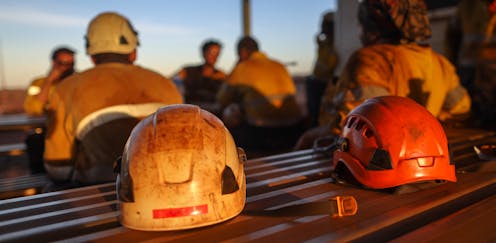BHP's vaccine policy 'not lawful and reasonable' – but this is no win for mandate opponents
- Written by Giuseppe Carabetta, Senior Lecturer, Sydney University Business School, University of Sydney

Australia’s Fair Work Commission has made its first ruling[1] against an employer mandating COVID-19 vaccination as condition of work. But this isn’t the decision those opposed to vaccine mandates have been hoping for.
On Friday a full bench of the commission ruled that global miner BHP’s directions to employees at its Mt Arthur coal mine, in NSW’s Hunter Valley, regarding deadlines for vaccination were not lawful and reasonable.
This is a significant decision by Australia’s industrial relations umpire in a number of ways. It is the first ruling to question the validity of mandatory vaccination policies, and the first regarding an employer COVID-19 mandate not backed by a public health order. It is also a full bench decision, involving five tribunal members, which gives the ruling extra weight.
But contrary to social media chatter, it’s not a decision spelling defeat for employers mandating COVID-19 vaccination as condition of work.
Indeed the ruling[2] isn’t really about the overall validity of Mt Arthur’s vaccine mandate. Its focus is instead management’s failure to properly consult with its employees under work health and safety laws.
It doesn’t question employers’ general right to introduce issue mandatory vaccination policies. In fact, it endorses this right – so long as they are “lawful and reasonable”.
Background to the BHP vaccine dispute
The dispute on which the Fair Work Commission adjudicated arose from management at BHP’s Mt Arthur mine site announcing on October 7 that all workers had until November 9 to show they had received at least one dose of a Covid-19 vaccine (and to be fully vaccinated by 31 January 2022).
After November 9 passed, about 50 workers were stood down without pay for failing to show evidence of vaccination.
About 1,700 people work at the mine. About 700 are covered by the Mt Arthur Coal Enterprise Agreement 2019[3] and represented by the Construction, Forestry, Maritime, Mining and Energy Union.
The union applied to have the Fair Work Commission rule on whether management directions to employees covered by the enterprise agreement were lawful and reasonable.
Unions have made similar claims in the past about employers failing to adequately consult[4] on mandatory vaccination policies, such as the Australian Manufacturers Workers Union’s gripe with Victorian fruit-canning company SPC Australia.
Read more: Why unions support vaccination — but not employer mandates[5]
General principles confirmed
The full bench agreed management had not sufficiently consulted with workers over its announcement of deadlines for vaccination.
Its judgement reaffirmed two general principles made in previous rulings regarding non-COVID vaccination policies.
First, employers have a right to ask an employee to be vaccinated without a public health order, an express term in an employment contract or other specific law, but the direction must be be “lawful and reasonable”.
Read more: Qantas has grounds to mandate vaccination, but most blanket policies won't fly[6]
Second, whether a direction is reasonable depends on factors including the nature of the work, established practices, industrial instruments (such as awards and enterprise agreements); and consultation requirements such as those under work health and safety laws.
In other words, its reasonableness depends on the circumstances.
Broad observations on vaccine policies
While noting “it is not appropriate to make general statements about whether a direction of a particular character is a lawful and reasonable direction”, the Full Bench did think there was “some utility in making some broad observations” relating to such policies.
These were:
If the purpose of a direction is to safeguard workplace health and safety, it is likely to be lawful, because it falls within the scope of the employment contract and there is nothing unlawful about being vaccinated.
The reasonableness of a direction is essentially a question of “fact and balance”, assessed case by case.
There may be a range of options open to a particular employer that satisfy reasonableness, and it is not necessary to show a policy accords with ‘best practice’.
Factors in favour of a mine mandate
In the case of the Mt Arthur mine dispute, the ruling lists six factors that would count in favour of the reasonableness of the vaccine mandate:
It was directed at ensuring the health and safety of workers of the mine.
It was logical and understandable.
It was a reasonably proportionate response.
It was developed having regard to the circumstances at the mine.
The timing was determined by reference to local circumstances.
It was implemented only after the employer had spent considerable time encouraging vaccination.
The mine’s management fell short on one crucial thing – its obligation under under work health and safety law to consult with employees. As the ruling states:
Had the Respondent consulted the Employees in accordance with its consultation obligations − such that we could have been satisfied that the decision to introduce the Site Access Requirement was the outcome of a meaningful consultation process – the above considerations would have provided a strong case in favour of a conclusion that the Site Access Requirement was a reasonable direction.“
So this is an important victory for employees and unions, acknowledging the importance of genuine and meaningful consultation. But any celebration by those opposed to vaccinations is likely to be short-lived.
The ruling leaves room for BHP to recommence the consultation process. The Fair Work Commission has offered to facilitate these discussions. BHP can then reintroduce the policy.
Following the full bench’s requirements provides a "road map” for other major employers to follow without a detour to the industrial relations tribunal.
References
- ^ made its first ruling (www.fwc.gov.au)
- ^ ruling (www.fwc.gov.au)
- ^ Mt Arthur Coal Enterprise Agreement 2019 (www.fwc.gov.au)
- ^ failing to adequately consult (theconversation.com)
- ^ Why unions support vaccination — but not employer mandates (theconversation.com)
- ^ Qantas has grounds to mandate vaccination, but most blanket policies won't fly (theconversation.com)

















